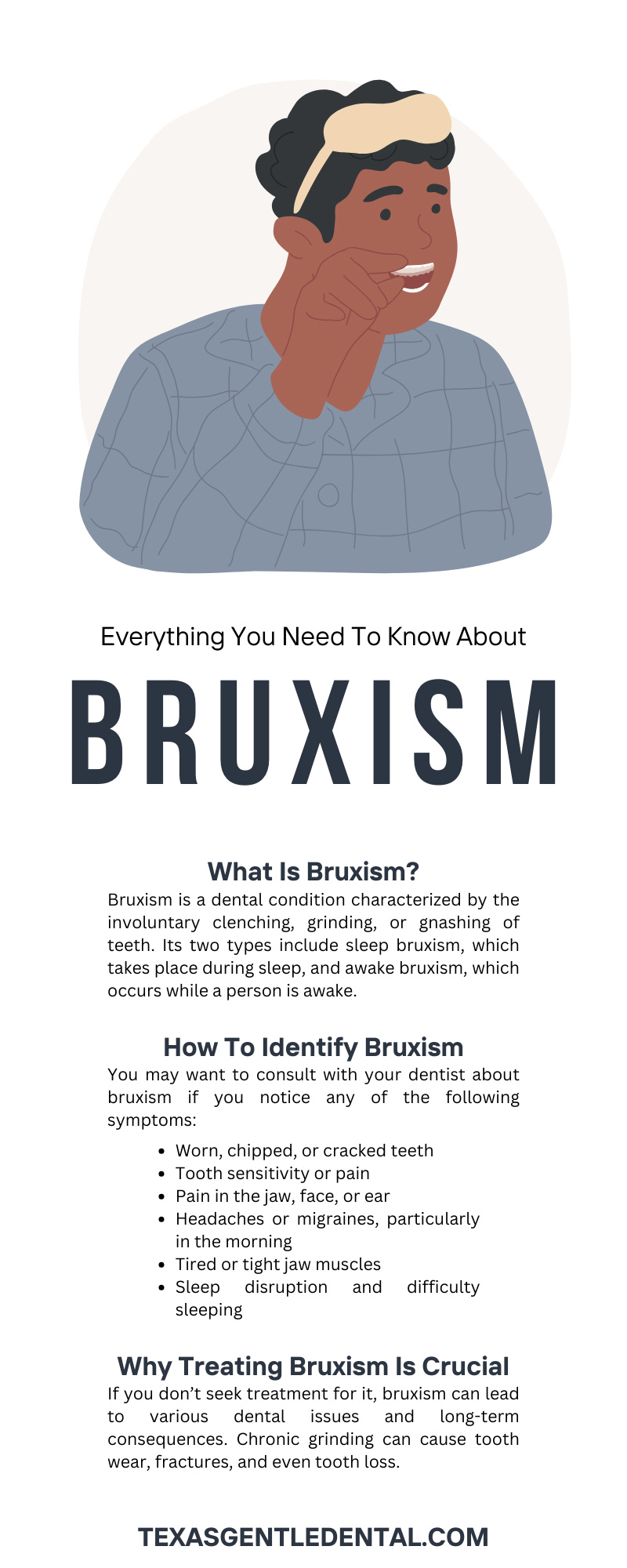Everything You Need To Know About Bruxism

Bruxism is an unfamiliar term to many people, but it affects millions of people worldwide. Also known as teeth grinding, bruxism can cause poor dental health and conditions. If you’re unfamiliar with this condition and its effects, we’ll outline everything you need to know about bruxism, from causes and symptoms to prevention and treatment.
What Is Bruxism?
Bruxism is a dental condition characterized by the involuntary clenching, grinding, or gnashing of teeth. Its two types include sleep bruxism, which takes place during sleep, and awake bruxism, which occurs while a person is awake. It can occur at any time, but most patients experience it while they’re asleep. These repetitive jaw movements can lead to dental problems such as tooth wear, jaw pain, headaches, and even damage to the temporomandibular joint (TMJ). It’s crucial to be aware of bruxism and notify your dentist if you notice any signs of this condition.
What Causes Teeth Grinding
There’s no single cause of bruxism, but experts believe it the underlying causes to be a combination of physical, psychological, and genetic factors. Some common factors associated with teeth grinding include:
- Stress and anxiety: High levels of stress and anxiety can be significant contributors to bruxism.
- Sleep disorders: People with sleep disorders such as sleep apnea are more likely to develop sleep bruxism.
- Medications: Certain medications, especially antidepressants, can cause bruxism as a side effect.
- Lifestyle factors: Smoking, alcohol consumption, and excessive caffeine intake can increase the risk of bruxism.
- Genetic predisposition: A family history of bruxism can also be a factor that causes the condition to develop.
How To Identify Bruxism
Diagnosing bruxism can be challenging, as many individuals are unaware that they grind their teeth, especially if it occurs while they sleep. However, you can look for some common signs and symptoms in your daily routine. You may want to consult with your dentist about bruxism if you notice any of the following symptoms:
- Worn, chipped, or cracked teeth
- Tooth sensitivity or pain
- Pain in the jaw, face, or ear
- Headaches or migraines, particularly in the morning
- Tired or tight jaw muscles
- Sleep disruption and difficulty sleeping
If you or your dentist suspects bruxism, they may call for a comprehensive examination, including a review of your medical and dental history. This can help them determine if teeth grinding is causing your symptoms.
Why Treating Bruxism Is Crucial
If you don’t seek treatment for it, bruxism can lead to various dental issues and long-term consequences. Chronic grinding can cause tooth wear, fractures, and even tooth loss. The pressure on the jaw can also result in temporomandibular joint disorder (TMD), causing pain and discomfort in the jaw, facial muscles, and neck.
Untreated bruxism can affect your quality of life, leading to sleep disruptions, chronic headaches, and further stress and anxiety. Seeking treatment for bruxism is essential to preventing these complications and improving your oral health.
Treatment Options for Teeth Grinding
Several treatment options can alleviate symptoms and prevent further dental complications. Depending on the severity and underlying causes, your dentist may recommend one or more of the treatments below.
Custom Mouth Guard
A custom mouth guard, also known as a dental splint or occlusal splint, is often the first treatment for bruxism. The mouth guard creates a barrier between the upper and lower teeth, protecting them from the pressure and friction caused by grinding. Mouth guards are common treatments option for nighttime bruxism patients.
Reduce Stress
Since stress and anxiety are common triggers of bruxism, finding ways to reduce these emotions can alleviate symptoms. Practices such as meditation, exercise, and therapy can be beneficial in managing stress.
Medications
In some cases, a dentist may prescribe medications such as muscle relaxants or antidepressants to relax the jaw muscles and reduce teeth grinding. However, professionals will usually prescribe these as short-term solutions, and the medications could have side effects.
Teeth Restoration
Severe cases of bruxism may require dental procedures to correct the damage caused by teeth grinding. These can include crowns, bridges, or even orthodontic treatment to realign the teeth and jaw. Your dentist will be able to help you determine whether you need restorative treatment from teeth grinding.
Tips To Prevent Teeth Grinding
Preventing bruxism can be a challenge, especially if it’s related to factors beyond your control, such as a genetic predisposition or a sleep disorder. However, you can follow a few tips to mitigate your teeth grinding.
- Avoid alcohol and caffeine: These substances are known to exacerbate teeth grinding. Consider limiting your intake and staying conscious of how many alcoholic or caffeinated beverages you drink, particularly in the hours leading up to bedtime.
- Manage stress: Engage in relaxation techniques such as yoga, meditation, and deep breathing. If these self-care strategies don’t help, considering getting professional help such as cognitive behavioral therapy may be worthwhile.
- Maintain a regular sleep schedule: A regular sleep pattern can reduce bruxism associated with sleep disorders.
- Stay aware: If you have symptoms of awake bruxism, try to be conscious of clenching and find ways to relax your jaw. Some people find it helpful to hold their tongues to the roofs of their mouths when they notice themselves starting to clench or grind.
- Get regular dental checkups: Regular dental visits can help your dentist detect the early signs of bruxism, allowing for early intervention and potentially preventing further damage to your teeth.
Remember, each case of bruxism is unique, so consulting with a health-care provider for a comprehensive evaluation and personalized treatment plan is always important. With proper management, you can control your bruxism and alleviate the associated symptoms to improve your overall oral health and quality of life.
Bruxism is a common yet often-overlooked dental condition that can lead to various oral health issues and affect one’s overall well-being. There isn’t a single cause or cure for bruxism, but understanding the potential triggers and available treatment options can help you manage and mitigate its effects. Remember, taking care of your teeth is essential, so don’t forget to schedule those regular dental checkups and seek professional advice if you suspect you may have bruxism.
At Gentle Dental Care, our orthodontic specialists in the greater Houston area can help you understand your own personal journey with bruxism. Reach out today if you’re looking for dental care related to teeth grinding or other common dental issues.
